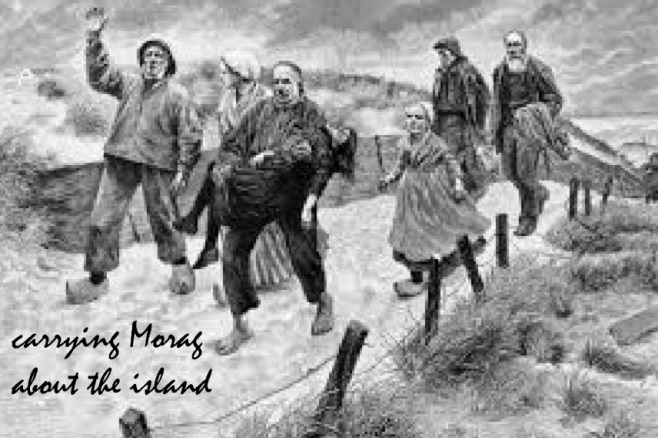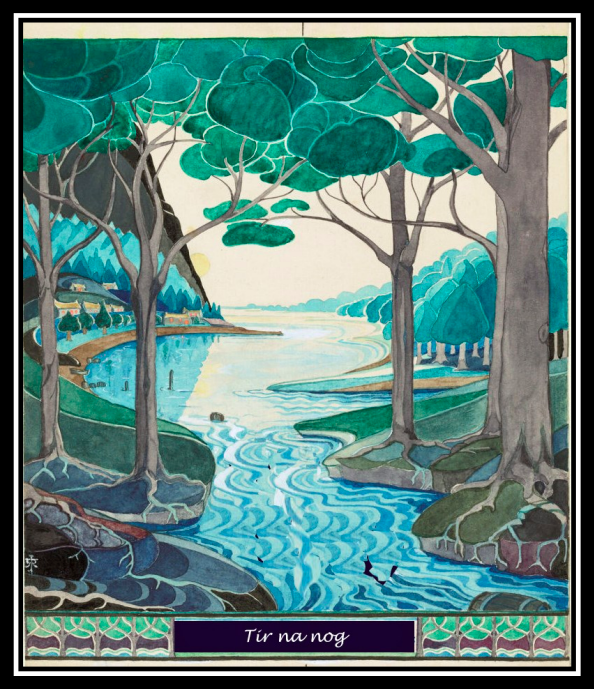On the sunny summer morning when Morag becomes sick, she didn’t get out of bed to go to work in the fields.1 Aunt Flora came to her room, wielding the tawse; the leather strap she had lashed her with many times before. Morag was already around thirty years old — a grown woman; it had been a long time since her husband’s sister had whipped her for being slothful and lazy. But Flora had warned her that if she returned to her old lazy ways, she would have to wield the tawse again. She always treated Morag as if she were a sinful child, not a mature woman with many children.
Despite having a proud family background, Morag had been beaten down by the way she had been treated by the Campbell family and the islanders. She had had a hard life. The church minister, her family, and the islanders despised her for being a bastard child. The minister had forbidden her to enter the church. So before she married, she was left alone in the cottage, while her grandparents attended church.
Mary, her grandmother explained that it was the WORD OF GOD. It was written in God’s Bible that “No one born of a forbidden marriage nor any of their descendants may enter the assembly of the LORD; not even in the tenth generation.”2 GOD THE FATHER had thus declared that because her mother had been molested by a man, she was destined to be an outcast. So she was not surprised that she became ill; she believed it was God’s way of punishing her for her ‘misdeeds’ and the ‘misdeeds’ of her mother by ‘tempting’ men to abuse them.3
Perhaps it was rather the case that she had inherited her illness (her ‘paralysis’) from the genes of her ancestor; but who will ever know or tell her on this island, where there is no doctor, that her illness has nothing to do with ‘shame’ or ‘God’? That it is just some arbitrary fact of human life? However, despite being bedridden and barely thirty years old, she was still a very attractive young woman—at least to her husband, Ruaridh!
Ruaridh’s Continued Assault
She was still beautiful to her husband, even though she was confined to her bed. After he had had his fill of whisky at the old tavern, he would return to the croft and demand that she fulfil her ‘wifely duties.’ To put it bluntly, he found it convenient that she was always ‘ready’ and ‘waiting for him’. She was always lying in bed, unable to move and resist his invasions of her body. He would return from the old tavern where he drank with his friends, fired up by too much whisky, and demand her ‘affection’. He always expected Morag to perform her wifely ‘duties.’
Ruaridh would even boast to his drinking buddies that his wife was not like other contrary women. She wasn’t running around the island flirting with other men; she was always ‘ready’ for him and never ‘refused’ him. Of course, his friends had their own thoughts about this. It was hardly a manly act to be intimate with a bedridden woman. But of course they never expressed their thoughts, as they didn’t want to end up ‘bedridden’ themselves; such was the case of Duncan Ferguson who had made jokes about his ‘horse-faced’ sister Flora.
When Ruaridh entered the cottage on returning from the tavern, he would wake her up from her slumber and start kissing her. And every time it happened, she had an idea in her head. She talked to him, but only in her head, telling him how she felt about his drunken incursions. She would tell him (inside her head):
“Don’t come home when you’ve been drinking with love on your mind. When you’ve been drinking with your pals at the tavern and come home half-drunk, let me tell you that whisky and love just don’t mix. Leave the whisky alone, or leave me alone! It’s entirely up to you. Don’t come home drunk and thinking about love.”4
These lines are what Morag would have said to him; had she been healthy and strong, she might have been able to stand up to him. Instead, she just had to accept her fate as an ‘always available bedmate’ because of her paralysis.
He sometimes covers her mouth with his large hand, just like when he first assaulted her so she wouldn’t make too many objectionable noises. He didn’t want his children or sister to hear her gripes. Morag was a small woman, half the size of her husband, so his brutish invasions were painful; thus, he had to cover her mouth with his hand. In other words, their intimate relations would always result in pain for her and pleasure for him. “Was this God’s plan?” Morag would often think while being violated by her husband.
The duplicity and sexual promiscuity of Eve, that is her tempting Adam to eat the carnal apple,5brought down the wrath of the male God upon all women in the forever and hereafter. God deemed that all women for eternity will experience “sharp pain in childbirth”. In addition, he commanded that they will desire their husband, but he will rule over them.6
When Ruaridh made his nightly drunken assaults on her body, she would often say, “Ah dae nae feel weel.”
But he would answer:
“Dear, ye dae nae wantae wake up th’ bairns or mah sister. Be quiet now, ‘n’ behave lik’ an obedient guidwife. Dae nae provoke oor Lord Jesus ‘n’ oor Lord God. Wha hae said, ‘Wife, submit to your husband as to the Lord, for the husband is the wife’s head, just as Christ is the head of the Church.“78
But the creaking of the old bed warned the children and Ruaridh’s older sister to what was going on. They often heard the creaking in the middle of the night. It was like the creaking of the timbers of some old ghost ship it kept them awake, as they imagined the ghosts of an old galley might haunt their cottage. It was deafening to their ears, as if the bed’s wooden legs were about to collapse, as Ruaridh’s heavy body ploughed the tiny body of his young wife.
That field was still fertile, despite its disease. If wood could scream, it would let out the sound of the banshees. Little did the children suspect that the ‘creaking’ of the old ship’s ‘timbers’ would result in more brothers and sisters.
Morag and the Church
One would think that Ruaridh only married Morag out of guilt and pressure from his father. But Ruaridh ‘loved’ Morag in his own strange way. Despite the fact that his wife was a bastard and a cripple, and that he had abused her on numerous occasions, he was proud of her and cared for her in his own way. He wanted to protect her, and God help any man who questioned her worth!
In his mind, his love was only greater due to the fact that he had treated her so gravely on their first ‘meeting’, and when he had ‘abused’ her during their days of marriage. In other words, he was not a man who enjoyed abusing his wife, as he always felt guilty about his sinful incursions. Of course, this is nothing new. Abusive men are often ‘apologetic’.
As mentioned above, Minister Sinclair had forbidden Morag to enter the church as she was a bastard child. However, there would have been no church if Ruaridh had not spent five years rebuilding it as part of his repentance for his sin of fornication. So, Ruaridh had proposed that just as he had rebuilt the church brick-for-brick, he could also demolish it brick-for-brick if the minister denied his wife’s entrance to the church. No man on the island, not even the laird, dared refuse a request from Ruaridh. Even then, they believed he was descended from the Viking ‘berserkers.’
In other words, his own life meant nothing to him—only his honour. There was no man on the island that dared cross the ‘Viking’ Ruaridh. So the minister repented, saying his wife could be given exemption from the biblical prohibition of admitting illegitimate children to the church, as Morag was not the architect of the sin.
Every Sunday, he would carry Morag to church. He’d also take her to see friends and family. Carrying her was like carrying a sack of light feathers since she was a mere slip of a woman. His odd devotion to his wife moved the islanders. They were touched by his strange love for her. He would occasionally take her to the north side of the island to the ‘singing sands’ where she could gaze out at the majestic Isle of Rhum and watch her children run barefoot along the beach.9 This is the same beach she and her girlfriend Sheena played on during their childhood summers.

Ruaridh loved her deeply, at least in his own way, despite the fact that he had defiled her on their first encounter, and later taken advantage of her when she was paralyzed and confined to her bed.
Morag’s Life as a Married Woman Continued
As mentioned, Morag was born illegitimate. She married at an early age. Most of her mature life was spent by giving birth to countless children. She became sick at the age of thirty and died before reaching forty. This story could have been written by the naturalist, Thomas Hardy. However, it is not a ‘story’ as such, it was the fate of thousands of women in Victorian rural Britain.
If we could ask Morag – “How was your life?” Most probably, like many other women at that time, she would have answered, “I wish I could have done things differently.”
Of course, from a present-day perspective, this seems absurd. Because women didn’t have control over their lives—especially poor women. She was born illegitimate. Women could not get divorced in the nineteenth century. No charity was available for women such as Morag, not to mention medical help. The words of the marriage covenant start to make sense, ‘for better or worse,’ because women were dependent on their husbands, as they couldn’t expect help from the church or the state.
So, even though Morag thought she could ‘have done things differently,’ she had little opportunity and just had to make the best of things.
Conditional Love
Despite being traumatized by her husband’s first assault and many other ‘assaults’ during their marriage, she realized she may have been far worse off without him; at the very least, he had contributed to the birth of her children, whom she adored. Not only that, she was now the wife of one of the most respected crofters on the island. Her children would also be respected on the island when they have their own families. In fact, her children and grandchildren, unknown to her, would come to be amongst the most influential islanders in the time to come, but this is another story.
Morag was now ill and in terrible health. Ruaridh, on the other hand, was attentive to her needs. The sick and infirm were frequently abandoned, like old Moire McQuarrie. Despite the fact that Morag had many reasons to be unhappy with the father of her children, she believed that, after all, her life may have been far worse without him.
She lived a difficult life as a woman, dedicating her entire being to Ruaridh and her children. However, she was unable to fully forgive him for his sins against her. So her ‘love’ was ‘conditional’ rather than ‘unconditional’ – she rarely expressed open affection for him; sometimes, she opposed him when he made excessive marital demands.
She reasoned to herself that he was “just a man”10 and wasn’t any different from other men. Despite his flaws and assaults, perhaps she was in some ways proud of him. After all, his life was bound with hers.Her legs were paralyzed, but she still had two arms to hug him and a warm body he could retreat to on cold, lonely evenings. Despite everything, she would stick by him,11 although she imagined a better life – perhaps in her next life.
Sources
- She became ill in the late 1880s. ↩︎
- The Bible, Deuteronomy 23:2. (Moses). ↩︎
- “The sins of the fathers (and mothers) are inherited upon the children”: Ibsen, Henrik. Ghosts. 1881. ↩︎
- Inspired by “Don’t Come Home A Drinkin (With Lovin’ On Your Mind).” Tammy Wynette. ↩︎
- The Bible, Genesis 3:16 (attributed to Moses). ↩︎
- Ibid. ↩︎
- The Bible. The Ephesians 5:22-33. The Apostle Paul. ↩︎
- Dear, you do not want to wake up the children or my sister. Be quiet now and behave like an obedient wife. Do not provoke our Lord Jesus and our Lord God, who have said, ‘Wife, submit to your husband as to the Lord, for the husband is the wife’s head, just as Christ is the head of the Church.’ Now be quiet and behave like a good wife.” ↩︎
- Conversation with Katie MacKinnon 2007: “They were wild happy times – all the children running free barefoot over the island without parental interference.” ↩︎
- “Stand by Your Man” by Tammy Wynette (YouTube clip): https://www.youtube.com/watch?v=AM-b8P1yj9w Read: 18 March 2022. ↩︎
- Inspired by Tammy Wynette, “Stand by your man”. ↩︎



